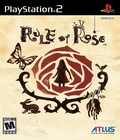Rule of Rose
Publisher: Atlus
Developer: SCEI
Release Date: September 12, 2006
To some extent, most games require you to suspend your disbelief, and that’s never been more true than with the survival horror genre. You’ve got to be willing to buy into a survival horror game on its own terms and empathize with the character(s), or it won’t have any sort of horrific impact on you. Anyone who’s played a horror game with that one jerkass friend we all have, who can’t help but make fun of anything that pops up on a screen, knows that.
I’m bringing this up, because Rule of Rose requires a damn sight more suspension of disbelief than just about any other game I’ve ever played. It’s a game about surreal activities in a relatively realistic setting; imagine a situation where your ordinary life, without warning, turned into something out of the darkest and nastiest kinds of folklore, where the ordinary rules of society no longer apply.
It’s also the kind of game where you have to wonder just what the hell is wrong with some people, but that’s neither here nor there.
Rule of Rose begins in 1930, in England, as a young girl named Jennifer is riding the bus through the countryside. The bus is empty except for her, the driver, and a young boy, who presents Jennifer with a homemade children’s book entitled The Little Princess. Jennifer gets off the bus to try to give the boy the book back, and the bus takes off without her.
Alone in the middle of nowhere, Jennifer chases the boy into a boarding school, albeit one with no adults to be found. The children have organized themselves into something they call the “Aristocrats’ Club,” and are obeying the rules and rituals of what appears to be their own self-made society. Maybe it’s their religion.
Upon meeting the children, Jennifer is seamlessly incorporated as the lowest-status member of the club, a beggar among nobles. She must not only put up with the hazing rituals of the Aristocrats’ Club, but deal with whatever bizarre supernatural influences apply to the situation. Bizarre undead children with a taste for murder are stalking her every step, and as she gets closer to the heart of the mystery, the blank pages of The Little Princess are filling themselves in.
Rule of Rose, in other words, is a sort of dark fairy tale, complete with its own bizarre mythology. Inanimate objects talk to Jennifer to reveal clues, children speak in cryptic riddles, and Jennifer herself seems like she’s moving through a waking dream. The natural surreality of a Japanese survival-horror game is used to its fullest extent here; the odd puzzles that’re a trademark of the genre are basically part and parcel of the odd mythology of the Aristocrats’ Club.
Much of the game involves exploration and puzzle-solving, as Jennifer evades enemies – and you have to; Rule of Rose is not an easy game once monsters begin to appear – and gets around obstacles. To some extent, it’s very much like Silent Hill, where you find your way through vast locations trying to find doors that actually work.
Another parallel with Silent Hill, honestly, is the soundtrack. Rule of Rose’s soundtrack is mostly comprised of melancholy strings, such as a deeply sad cello piece (I think it’s a cello, anyway; apologies in advance if I’m wrong). It’s one of the most evocative scores in recent memory, and goes a way towards remedying some of the game’s other faults.
Your greatest ally and tool, simultaneously, is Brown, a friendly dog that Jennifer rescues in the game’s second level. You can offer any item in your inventory to Brown, so he’ll get a scent and begin to sniff out related materials; for example, giving him a woman’s hat will lead him towards the woman’s other possessions, such as a valuable key. To defend herself, Jennifer can equip weapons ranging from a dessert fork to a revolver, but her best option is usually to run the hell away.
That’s one of Rule of Rose’s problems, admittedly. It’s slow-paced, especially until you find Brown; its combat system is crippled; and the story has a tendency to fall apart if you look at it funny. (Call me crazy, but I have to really suspend my disbelief before homicidal ten-year-olds become viable horror antagonists.)
This may be part of its appeal, perversely. If you’re willing to sit down with it, focus, and allow yourself to believe in the world it presents (wow, I’m a wanker all of a sudden), Rule of Rose is a unique experience.
More articles about Rule of Rose













 You play as Jennifer, and stumble into a world where the rules are written by children, seemingly innocent children, but with a sadisctic mindset. Your job is to get to the truth, solve puzzles & mysteries.
You play as Jennifer, and stumble into a world where the rules are written by children, seemingly innocent children, but with a sadisctic mindset. Your job is to get to the truth, solve puzzles & mysteries.




















